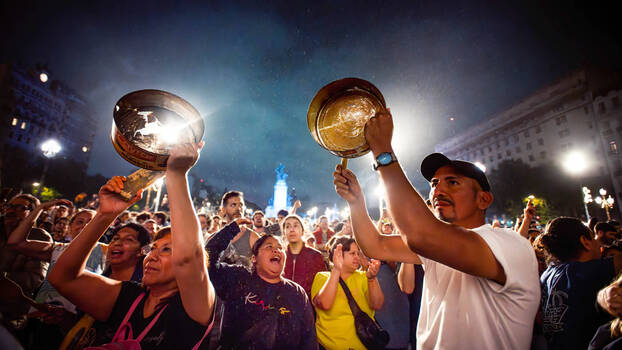
Well, that escalated quickly.
In the very first week of Argentina’s new government, the new Minister of Security, Patricia Bullrich, issued a raft of decrees authorizing draconian measures against street blockades during protests. Yet the protests by human rights organizations and legal experts, who considered them unconstitutional, were quickly drowned out by the next wave of outrage.
Torge Löding directs the Rosa Luxemburg Foundation’s Buenos Aires Office.
Traditionally, left-wing and far-left groups in Argentina commemorate the anniversary of the 2001 emergency legislation, which sparked a social uprising, with a protest march in front of parliament on 20 December. This time it was also the first protest against the government of Javier Milei, which carefully made its way to the Plaza de Mayo to avoid clashes with the local and federal police. The demonstration was largely peaceful and did not become the new government’s first test of strength. On the way home, however, many participants heard the president’s next resounding announcement.
Milei chose the highly symbolic date of 20 December to present a “Decree of Necessity and Urgency” (DNU) with 300 measures in a speech broadcast nationwide by all broadcasters. This was the last form of communication chosen by President Alberto Fernández, who has since left office, to announce his government’s rescue measures during the pandemic. Indeed, Milei goes all out in both form and content.
In Argentina, rushing through a mega-decree as a DNU is limited to emergencies such as a state of war or a pandemic. It is highly controversial whether Milei has acted in accordance with the constitution, but he is focusing on speed and hopes to undermine his critics in this way. His decrees came into force on 28 December 2023. Neither the courts nor parliament have yet managed to stop them.
The new government also staged its first television appearance with a completely new aesthetic. In front of the new emblem of the presidential palace, a copy of the White House logo, the government team and their unelected advisors sit together in harmony, as if in a family photo. It embodied the essence of this government: under the leadership of the ultra-liberal Thatcherite and far-right esoteric Milei — still wrongly labelled an “anarcho-capitalist” outside Argentina — a group has assembled alongside Vice President Victoria Villaruel, the daughter of a leading general from the dark years of the military dictatorship and today a lobbyist for the old junta generals, including the bourgeois wing of a government with economists from the Mauricio Macri administration (2015–2019), who are now hoping for the economic shock doctrine that they were denied under Macri. They are joined by Patricia Bullrich, the old (under Macri) and new Minister of Security who led the conservative alliance Juntos por el Cambio (“Together for Change”) to a catastrophic defeat in these elections and then committed herself to the alliance with Milei in order to avoid slipping into political insignificance.
Milei far surpasses the government of convicted ex-president Jair Bolsonaro from neighbouring Brazil in terms of the pace of destruction. But resistance is also growing faster in Argentina.
The 300 measures were supplemented by ten laws that are to be rushed through parliament in 2023. What Milei’s announcements, ordinances, decrees, and laws are all about is easy to sum up: first and foremost, total privatization of public companies and public property, complete deregulation and the destruction of workers’ rights and environmental standards. Tens of thousands of public employees will lose their jobs. The massive devaluation of the national currency, the peso, will lead to bargain-bin prices, especially for US companies, e.g. when purchasing lithium or fracking gas as soon as exports are liberalized. A self-service gourmet buffet for billionaires and friends of ex-President Macri and Milei.
The latter makes no secret of the fact that there is nothing to gain for the majority of the population. “Things will get worse before they get better”, is the president’s neoliberal credo. Social standards are being abolished, because for Milei, “social rights are an injustice because they are taken away from others”.
Milei far surpasses the government of convicted ex-president Jair Bolsonaro (2018–2022) from neighbouring Brazil in terms of the pace of destruction. But resistance is also growing faster in Argentina. His speech was seen as a declaration of war by large sections of organized civil society and was met with spontaneous pot-banging and other loud protests from windows. On 27 December, trade unions organized protest marches with tens of thousands of participants. Nevertheless, that will not be enough to actually stop the cuts.
Milei only has a small number of MPs in the two chambers of parliament, and even with his allies from the conservative party, PRO, he does not actually have enough for a majority. However, in the few days of government action, Vice-President Villaruel has already shown astonishing skill in integrating forces of right-wing provincial Peronism into her camp. This could lead to a right-wing majority in the structurally conservative Senate. It is likely to be more difficult for Milei in parliament, but here, too, the balance of forces is so unclear that surprises cannot be ruled out.
If nothing else, 2024 will be an interesting year in Argentina.
Translated by Loren Balhorn.